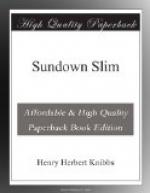[Illustration: “God A’mighty, sech things is wrong.”]
The cowboy raised himself on rigid arms, he lifted his head, and his eyes, filmed with the chill of death, grew clear for an instant. “’Sandro—the herder—got me,” he gasped. His lips writhed back from his clenched teeth. A rush of blood choked him. He sank to the ground, quivered, and was still.
“’Sandro . . . the herder” . . . whispered Sundown. “Sinker was me friend. I reckon God’s got to leave the finish of this to me.”
CHAPTER XXII
WAIT!
To see a man’s life go out and to stand by unable to help, unable to offer comfort or ease mortal agony, is a bitter experience. It brings the beholder close to the abyss of eternity, wherein the world shrinks to a speck of whirling dust and the sun is but a needle-point of light. Then it is that the fleshless face of the unconquerable One leans close and whispers, not to the insensate clay that mocks the living, but to the impotent soul that mourns the dead.
That Sundown should consider himself morally bound to become one of those who he knew would avenge the killing of the cowboy, and without recourse to law, was not altogether strange. The iron had entered his soul. Heretofore at loose ends with the world, the finding of Sinker, dying on the mesas, kindled within him righteous wrath against the circumstance rather than the individual slayer. His meandering thoughts and emotions became crystallized. His energies hardened to a set purpose. He was obsessed with a fanaticism akin to that of those who had burned witches and thanked their Maker for the opportunity.
In his simple way he wondered why he had not wept. He rode slowly to the Concho. Chance leaped circling about his horse. He greeted the dog with a word. When he dismounted, Chance cringed and crept to him. Without question this was his master, and yet there was something in Sundown’s attitude that silenced the dog’s joyous welcoming. Chance sat on his haunches, whined, and did his best by his own attitude to show that he was in sympathy with his master’s strange mood.
John Corliss saw instantly that there was something wrong, and his hearty greeting lapsed into terse questioning. Sundown pointed toward the northern mesas.
“What’s up?” he queried.
“Sinker—he’s dead—over there.”
“Sinker?” Corliss ran to the corral, calling to Wingle, who came from the bunk-house. The cook whisked off his apron, grabbed his hat, and followed Corliss. “Sinker’s done for!” said Corliss. “Saddle up, Hi. Sun found him out there. Must have had trouble at the water-hole. I should have sent another man with him.”




